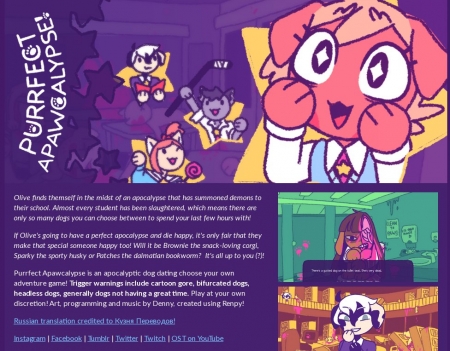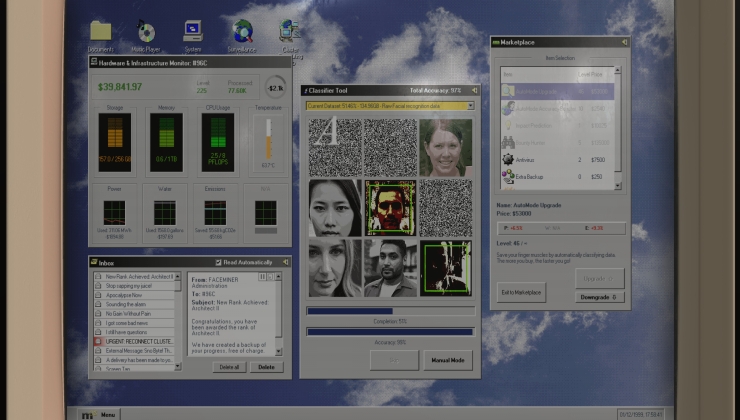The creator of indie store itch.io has issued a warning to game developers, as Chooseco appear to be trying to take down anything using the 'choose your own adventure' phrase.
Not surprising it's happening though, Chooseco went after Netflix for using the same phrase with Black Mirror: Bandersnatch. Speaking on Twitter, itch.io founder Leaf Corcoran stated:
Warning to any devs using the phrase "choose your own adventure" to describe their games, Chooseco is issuing takedown notices to @itchio for trademark infringement. Example game page they went after:
In a follow up Twitter post, Corcoran mentioned the person issuing the notices on behalf of Chooseco has been "difficult" and it comes across like they're essentially trolling. This is what happens though, often too, there's legal trolls everywhere. Some companies are set up just to go around sending off trademark notices on junk. I find it completely ridiculous that any company can trademark something like 'choose your own adventure', it just seems crazy to even allow that.
Regardless of how insane it is that such a thing can happen, game developers do need to come together and come up with something else they can use instead. Perhaps someone can then protect it themselves on the basis that anyone can use it, much in the spirit of open source eh? Can you think of a fun phrase that would fit? Let's see what you've got in the comments.
Last edited by TheRiddick on 10 Dec 2019 at 5:19 am UTC
Just wait until you get a trademark notice for using a trademarked colour.
And yes, you can trademark a colour.
https://www.heise.de/newsticker/meldung/Telekom-erhebt-Anspruch-auf-die-Farbe-Magenta-42400.html
If people can't use their own brains then maybe they just need to be flooded by so much copyright that they can't even open their mouth without getting fined. Sad that it has to go so far.
But yeah, this is beyond ridiculous.
Can you think of a fun phrase that would fit? Let's see what you've got in the comments.
Choose your story.
Common phrases or even words from the dictionary shouldn't be trademark-able, within reason.A lot of titles of book/game series are somewhat common words or phrases. "Foundation", "Dark Material", "Call of Duty" just to name a few.
If someone, today, tried to name a book series or game "Goosebumps" (a commonely used word/expression), they would get the pants sued off them for trademark infringement and they wouldn't have a leg to stand on.
This scam called "Intellectual Property" should be not only extinguished, but banished. It is not property (since it is not scarce) and it is only used to promote injustice.
How would game devs, artists, musicians, etc get paid for their work?
You can't rely solely on donations and the good will of people. If anything, legal trolls only prove that some people lack good will.
Does this mean that trademark is never abused? Of course not. I pointed out things that I thought were abuses in a previous post. That doesn't mean that trademark is a bad thing overall.
The best argument against this trademark is that protection for it wasn't pursued diligently enough in the years between when the books were popular and just recently. The phrase may seem generic now, but it was quite original back when the books were first introduced.
How would game devs, artists, musicians, etc. get paid for their work?Maybe by letting them do their work instead of scaring/suing them with non-sense because you have more (need of) money than ideas? Moreover IP is reserved to the richers who have enough wealth to pay lawyers and not to the indie.
IP is just a waste of time. You can not jail a thought.
Last edited by EverLinux on 10 Dec 2019 at 2:25 pm UTC
To be honest, this sounds like a fairly legitimate claim to me. The "Choose Your Own Adventure" series of books was pretty popular in the eighties, and everyone knew that the phrase referred to a very specific series of books. That phrase did not exist in English before those books came out. Some competitors released similar material, but they had to use a different name.The thing is, the ability to trademark some words isn't related to whether you "invented" or popularized those words. Otherwise Apple couldn't be a trademark. So I don't think this adds to the legitimacy of the claim.
There are several factors involved, but originality is a big one. If another company had already sold a line of computers they referred to as "Apple" computers, then Apple couldn't have trademarked their name.* As I explained before, the more original the trademark is, the wider a scope it can cover. The less original it is, the narrower the scope it must be limited to, and it always must be original to its scope. So yes, originality is a factor in trademark cases.
*Apple actually did have a lawsuit on its hands when they created the Apple Music service, because Apple Records existed before Apple Computers.
Actually Apple Corp did sue Apple Computers back in 1978 and they settled for $80k and allowed Apple Computers to use the Apple brand with the condition that they "agreed not to enter the music business" which is why they later got into trouble again 2003 when they launched the iTunes store.
I wanted to point out that trademark law is probably the most supportable form of so-called "intellectual property." Trademark law is a consumer protection law. The purpose of trademark is to prevent dishonesty in the marketplace. Trademark is a way of making sure that you are dealing with the company that you think you are. Without it, anyone could pretend to be representing a company that they have nothing to do with. With trademark you know that the mayonnaise that you bought is Hellman's or Cain's, the car you bought is a Toyota or a Chevrolet, etc. Without it you can't be sure of any of these things.
Does this mean that trademark is never abused? Of course not. I pointed out things that I thought were abuses in a previous post. That doesn't mean that trademark is a bad thing overall.
The best argument against this trademark is that protection for it wasn't pursued diligently enough in the years between when the books were popular and just recently. The phrase may seem generic now, but it was quite original back when the books were first introduced.
The problem is that the idea that you can trademark something generic such as "Choose Your Own Adventure" is not something that the public at large agrees with. Few people would argue against Hellman's, Chevrolet and so on, so the main problem is not trademark itself.
Another thing where there is a disconnect between the legal system and the general public is when you e.g cannot have non-profit Harry Potter gatherings. Also we are here talking about small indie developers, if EA would announce a large AAA "Choose Your Own Adventure" game tomorrow then I guess that people would be more inclined to agree that they had breached a true trademark.
The CYOA company is probably just angry because unlike Kleenex and others, a lot of people don’t even realize that it’s a brand and not a generic term, so they don’t get as much promotional value from other companies keeping the term alive.
The fact that people don't even realize it refers to your brand is probably the best possible argument for something not being a trademark.
I wanted to point out that trademark law is probably the most supportable form of so-called "intellectual property." Trademark law is a consumer protection law. The purpose of trademark is to prevent dishonesty in the marketplace. Trademark is a way of making sure that you are dealing with the company that you think you are. Without it, anyone could pretend to be representing a company that they have nothing to do with. With trademark you know that the mayonnaise that you bought is Hellman's or Cain's, the car you bought is a Toyota or a Chevrolet, etc. Without it you can't be sure of any of these things.
Does this mean that trademark is never abused? Of course not. I pointed out things that I thought were abuses in a previous post. That doesn't mean that trademark is a bad thing overall.
The best argument against this trademark is that protection for it wasn't pursued diligently enough in the years between when the books were popular and just recently. The phrase may seem generic now, but it was quite original back when the books were first introduced.
Except it fails spectacularly at any of this. It is never a case of consumers suing, it is the company. It works to stop what should be legitimate uses of descriptive phrases, fair use of character names, and the use of symbols and terms that are useful to the public. It is like a soft copyright more than anything.
And it doesn't even get close to preventing consumer confusion. That one would take much more burdensome regulation on what forms of marketing, brands, slogans and packaging are acceptable. If you want people to know what they are buying, having several brands with the same owner is a no-go. Full disclosure of production chains and affiliations should be strictly required. Changes to products and packaging should be even more heavily regulated.
a large AAA "Choose Your Own Adventure" game*chuckles*
...a large AAA "Choose Your Own Adventure" game...
Detroit Become Human
The CYOA company is probably just angry because unlike Kleenex and others, a lot of people don’t even realize that it’s a brand and not a generic term, so they don’t get as much promotional value from other companies keeping the term alive.
The fact that people don't even realize it refers to your brand is probably the best possible argument for something not being a trademark.
I wanted to point out that trademark law is probably the most supportable form of so-called "intellectual property." Trademark law is a consumer protection law. The purpose of trademark is to prevent dishonesty in the marketplace. Trademark is a way of making sure that you are dealing with the company that you think you are. Without it, anyone could pretend to be representing a company that they have nothing to do with. With trademark you know that the mayonnaise that you bought is Hellman's or Cain's, the car you bought is a Toyota or a Chevrolet, etc. Without it you can't be sure of any of these things.
Does this mean that trademark is never abused? Of course not. I pointed out things that I thought were abuses in a previous post. That doesn't mean that trademark is a bad thing overall.
The best argument against this trademark is that protection for it wasn't pursued diligently enough in the years between when the books were popular and just recently. The phrase may seem generic now, but it was quite original back when the books were first introduced.
Except it fails spectacularly at any of this. It is never a case of consumers suing, it is the company. It works to stop what should be legitimate uses of descriptive phrases, fair use of character names, and the use of symbols and terms that are useful to the public. It is like a soft copyright more than anything.
And it doesn't even get close to preventing consumer confusion. That one would take much more burdensome regulation on what forms of marketing, brands, slogans and packaging are acceptable. If you want people to know what they are buying, having several brands with the same owner is a no-go. Full disclosure of production chains and affiliations should be strictly required. Changes to products and packaging should be even more heavily regulated.
Trademark does not fail spectacularly. It mostly succeeds (though not completely; consumers can be a bit gullible).
Of course consumers don't sue over trademark. They don't have standing to do so. The fact that trademark protects the company with the trademark from being legally impersonated doesn't mean consumers are not protected from being fooled as well. Most of the good that trademark does is accomplished without lawsuits because people already know they would be the target of a lawsuit if they violated it.
It is not trademark's purpose to inform people that two different brands are owned by the same company. You would need another regulation for that. Also, it is possible for two different brands to actually have substantial differences while still being owned by the same company.
The fact that trademark is sometimes overextended and abused does not make it ineffective for legitimate purposes.
The idea that the phrase "Choose Your Own Adventure" now seems too generic to be a trademark is an allowed defense for a trademark lawsuit if the defendant can show enough use of the phrase for some period of time that was not stopped by the plaintiff or use of the phrase by someone other than the plaintiff within the scope of the trademark suit that predated the registration of the trademark. Of course not every case goes as it should. If you want the law to be perfect and perfectly applied, then you'll have to look elsewhere than laws created and/or applied by imperfect people.
I wanted to point out that trademark law is probably the most supportable form of so-called "intellectual property." Trademark law is a consumer protection law. The purpose of trademark is to prevent dishonesty in the marketplace. Trademark is a way of making sure that you are dealing with the company that you think you are. Without it, anyone could pretend to be representing a company that they have nothing to do with. With trademark you know that the mayonnaise that you bought is Hellman's or Cain's, the car you bought is a Toyota or a Chevrolet, etc. Without it you can't be sure of any of these things.You need something to stop that kind of thing, but I'm not clear that that something would have to look very much like current trademark law. Rather than the lawsuit system, the actual legal system might be better; simply have laws against such misrepresentation. For one thing, then it wouldn't only work for people with the money to sue. For that matter, what you're describing is probably covered by the actual legal system in many if not most jurisdictions.
...a large AAA "Choose Your Own Adventure" game...
Detroit Become Human
+1, now imagine if they had choose to call it "Choose Your Own Adventure: Detroit". I think most people that are negative now would find Chooseco in the right if they had sued Sony over that?!
Trademark does not fail spectacularly. It mostly succeeds (though not completely; consumers can be a bit gullible).
Of course consumers don't sue over trademark. They don't have standing to do so. The fact that trademark protects the company with the trademark from being legally impersonated doesn't mean consumers are not protected from being fooled as well. Most of the good that trademark does is accomplished without lawsuits because people already know they would be the target of a lawsuit if they violated it.
It is not trademark's purpose to inform people that two different brands are owned by the same company. You would need another regulation for that. Also, it is possible for two different brands to actually have substantial differences while still being owned by the same company.
The fact that trademark is sometimes overextended and abused does not make it ineffective for legitimate purposes.
The idea that the phrase "Choose Your Own Adventure" now seems too generic to be a trademark is an allowed defense for a trademark lawsuit if the defendant can show enough use of the phrase for some period of time that was not stopped by the plaintiff or use of the phrase by someone other than the plaintiff within the scope of the trademark suit that predated the registration of the trademark. Of course not every case goes as it should. If you want the law to be perfect and perfectly applied, then you'll have to look elsewhere than laws created and/or applied by imperfect people.
Trademark fails because it puts the interests of the company over those of the customers. Companies are allowed to misuse their own trademarks in ways that are arguably deceptive (implying different products are related), and choose to enforce them against others not due to a public interest in avoiding harm to customers but due to their personal interest in getting an advantage over a competitor. It can be sold, transferred or licensed, at the convenience of its owners (and not when necessary/beneficial for the public utility of the trademark). It is a privilege granted to businesses, not a regulation they have to follow. I find it disingenuous to argue that trademark law isn't, first and foremost, intended to protect trademark holders and their particular interests.
It is not a case of the law being abused. It is the case of wording the law in a way that goes counter its own (supposed) purpose.
I'm not saying there shouldn't be any laws to prevent misuse of identifying symbology... I'm just saying that laws protecting customers/the public interest shouldn't be granting third parties property rights over phrases. There are many other ways to regulate products to avoid fraud.














 How to set, change and reset your SteamOS / Steam Deck desktop sudo password
How to set, change and reset your SteamOS / Steam Deck desktop sudo password How to set up Decky Loader on Steam Deck / SteamOS for easy plugins
How to set up Decky Loader on Steam Deck / SteamOS for easy plugins
See more from me